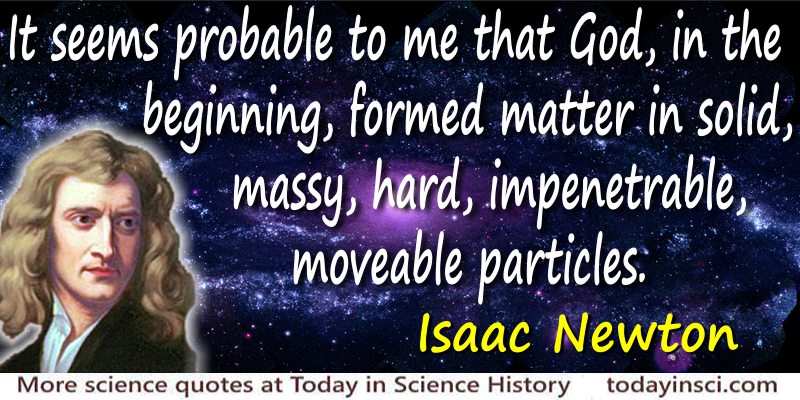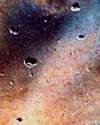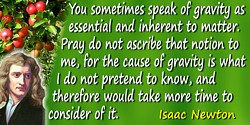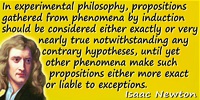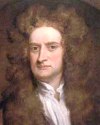 (source)
(source)
|
Sir Isaac Newton
(25 Dec 1642 - 20 Mar 1727)
English physicist and mathematician who made seminal discoveries in several areas of science, and was the leading scientist of his era.
|
Isaac Newton
“God, in the beginning, formed matter”
Illustrated Quote - Large (800 x 400 px)
More Isaac Newton quotes on science >>
The idea of atoms began in ancient Greek times in the sense of the hypothetical smallest parts of matter than cannot be cut into smaller pieces, as the building blocks of the universe. That is the direct meaning of the word, atom, which uses the prefix a- for negation, “not” + tomos “a cutting” (from temnein “to cut”). Thus the atom is “uncuttable.” The concept of these smallest particles was eventually used by the English chemist, John Dalton, to advance the understanding of chemistry.
The fertile mind of Isaac Newton turned to this concept, in his 31st Query, one of a number appended to his work on Optics. Newton published certain of his thoughts, each in the form of a question, “because I am not yet satisfied about it for want of Experiments.” He launched into considering this Query by writing:
“Qu. 31. Have not the small Particles of Bodies certain Powers, Virtues or Forces, by which they act at a distance, not only upon the Rays of Light for reflecting, refracting and inflecting them, but also upon one another producing a great part of the Phænomena of Nature?”
After speaking of chemical reactions, and various musings on attraction in different circumstances, several pages later he proceeds as follows:
“All these things being considered, it seems probable to me, that God in the Beginning form’d matter in solid, massy, hard, impenetrable, moveable Particles, of such Sizes and Figures, and with such other Properties, and in such Proportion to Space, as most conduced to the end for which he form’d them; and these primitive Particles being Solids, are incomparably harder than any porous Bodies compounded of them; even so very hard as never to wear or break in pieces: no ordinary Power being able to divide what God himself made one in the first Creation.”
Such ideas might be in harmony with our modern ideas about the atoms which created the Solar System and our own Earth, Such atoms then remain overall intact through chemical processes. Even the nuclear transmutations when atoms can be caused to “break in pieces” using particle accelerators might be regarded as the action of “no ordinary Power.” But as Newton continues, his thoughts are harder to interpret as a description of the formation and changes of molecules:
“While the particles continue entire, they may compose Bodies of one and the same Nature and Texture in all Ages; but should they wear away or break in pieces, the Nature of Things depending upon them would be changed. Water and Earth composed of old worn-out Particles, and Fragments of Particles, would not be of the same Nature and Texture now with Water and Earth composed of entire Particles in the Beginning. And, therefore, that Nature may be lasting, the Changes of corporeal Things are to be placed only in the various Separations and new Associations and Motions of these permanent Particles, Compound bodies being apt to break, not in the midst of solid Particles, but where those Particles are laid together, and only touch in a few Points.”
- Science Quotes by Sir Isaac Newton.
- 25 Dec - short biography, births, deaths and events on date of Newton's birth.
- Isaac Newton - biography from Famous Men of Science (1889)
- Isaac Newton - Comments on his “Playing on the Seashore” Quote
- Isaac Newton - “Playing on the Seashore” illustrated quote - Medium 500px.
- Isaac Newton - “Playing on the Seashore” illustrated quote - Large 800px.
- Isaac Newton - context of quote “A change in motion” - Medium image (500 x 250 px)
- Isaac Newton - context of quote “A change in motion” - Large image (800 x 400 px)
- Isaac Newton - context of quote “In experimental philosophy” - Medium image (500 x 250 px)
- Isaac Newton - context of quote “In experimental philosophy” - Large image (800 x 400 px)
- Isaac Newton - context of quote “Standing on the shoulders of giants” - Medium image (500 x 250 px)
- Isaac Newton - context of quote “Standing on the shoulders of giants” - Large image (800 x 400 px)
- Isaac Newton - context of quote “Impressed force is the action” - Medium image (500 x 250 px)
- Isaac Newton - context of quote “Impressed force is the action” - Large image (800 x 400 px)
- Isaac Newton - context of quote “Inherent force of matter is the power of resisting…” - Medium image (500 x 250 px)
- Isaac Newton - context of quote “Inherent force of matter is the power of resisting…” - Large image (800 x 400 px)
- Isaac Newton - context of quote “Plato is my friend” - Medium image (500 x 250 px)
- Isaac Newton - context of quote “Plato is my friend” - Large image (800 x 400 px)
- Isaac Newton - context of quote “Colours which appear through the Prism ” - Medium image (500 x 250 px)
- Isaac Newton - context of quote “Colours which appear through the Prism ” - Large image (800 x 400 px)
- Isaac Newton - context of quote “Nature does nothing in vain” - Medium image (500 x 250 px)
- Isaac Newton - context of quote “Nature does nothing in vain” - Large image (800 x 400 px)
- Isaac Newton - context of quote “No more causes of natural things should be admitted” - Medium image (500 x 250 px)
- Isaac Newton - context of quote “No more causes of natural things should be admitted” - Large image (800 x 400 px)
- Isaac Newton - context of quote “Truth is ever to be found in simplicity” - Medium image (500 x 250 px)
- Isaac Newton - context of quote “Truth is ever to be found in simplicity” - Large image (800 x 400 px)
- Isaac Newton - context of quote “Every body perseveres in its state of being at rest” - Medium image (500 x 250 px)
- Isaac Newton - context of quote “Every body perseveres in its state of being at rest” - Large image (800 x 400 px)
- Isaac Newton - context of quote “God, in the beginning, formed matter” - Medium image (500 x 250 px)
- Isaac Newton - context of quote “The cause of gravity is what I do not pretend to know” - Medium image (500 x 250 px)
- Isaac Newton - context of quote “The cause of gravity is what I do not pretend to know” - Large image (800 x 400 px)
- Sir Isaac Newton’s Apple-Tree - debunking the myth, from Historic Ninepins: A Book of Curiosities by John Timbs (1869)
- Newton and the Dog - debunking the myth about Newton’s dog Diamond.
- Booklist for Isaac Newton.
